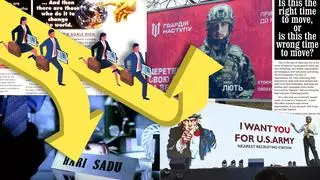Adil would go to school with his Milton lunchbox hung around the sleeve of his uniform. It was like an identity card for a school-going child. His friends could spot him in a crowd from a mile away just by looking at his orange-coloured lunchbox. For him, the lunchbox signified all things good - it was the embodiment of an idyllic childhood and personal fashion statement. His box not only contained delicious food cooked with his mother’s love but also showcased depictions of his favourite cartoon characters that made him stand out from the crowd.
Opening the box and unwrapping the foil gave him a sense of joy that was not found in other things, not even the games period that he would frantically look forward to. The lunchbox also had an immense power - once opened, its aroma drew all his classmates like ants to sugar.

All religious prejudices that might have been fostered in children by their friends or families were vanquished with the smell of the paranthas. The lunchbox united kids of all different castes and ethnicities, and food became their religion. It was funny how Adil got to know that a lunchbox can serve not just as a unifying but also as a divisive force when used with physical force.
One time, when Adil was sitting in his school bus, a bully sitting next to him grabbed his lunchbox and flung it across the street to hit their lanky classmate Jacob, whose only crime was that he happened to like the same girl as him. ‘Who knew containers of food could be weaponized as artillery?’ thought Adil. He was so shocked to see how wounded Jacob was from his lunchbox that he began to wonder if lunchboxes could actually serve as ammo in times of war. ‘What if the US dropped McDonald’s ‘Happy Meals’ instead of bombs on North Korea? Would that be considered as war or seen as a rescue mission?’ Much like the bully, his imagination had run amok.
While Adil was still recovering from the shock, the door of his school bus closed, and it started to move. His lunchbox was left lying on the other side of the road, like a wounded soldier covered in mud.
What ensued after he reached home was no less than war itself. His mother got furious as he’d come back without his Milton lunchbox. In a middle-class home, losing your lunchbox got you the same reprimand (perhaps even more) as failing a test did.
“Where’s your dabba?” Asked Adil’s mother.
“Well, you know, he was a gallant soldier.” Said Adil.
“Gallant soldier? What’s going on in your head? Are you light-headed?” Asked the mother.
“I don’t know, I guess I haven’t had food” replied Adil.
The angry look on his mother’s face suddenly changed to a look of concern.
“Come to the kitchen. I have your food ready. Dad will get you a new dabba, and this soldier better not be martyred anytime soon. Okay?”
Adil smiled as he knew he’d get his hands on a lunchbox with new cartoons to show off to his friends, and he’d be the coolest boy in his class.
When Adil went to school the next day, everyone was in awe of his lunchbox while Jacob stood in a corner holding his plain steel dabba, still recovering from yesterday’s fight. Adil called him in to share food, and once again, the lunchbox made everyone feel included.
(A-Z: This series of light hearted explorations on familiar objects from everyday life dear to the urban Indian middle class looks at how they shape our wants & desires and ultimately make us who we are as a people.)
(Hamsini Shivakumar is a Semiotician and founder of Leapfrog Strategy. Prabhjot Singh Gambhir is a senior research analyst at Leapfrog Strategy.)








Comments
Comments have to be in English, and in full sentences. They cannot be abusive or personal. Please abide by our community guidelines for posting your comments.
We have migrated to a new commenting platform. If you are already a registered user of TheHindu Businessline and logged in, you may continue to engage with our articles. If you do not have an account please register and login to post comments. Users can access their older comments by logging into their accounts on Vuukle.